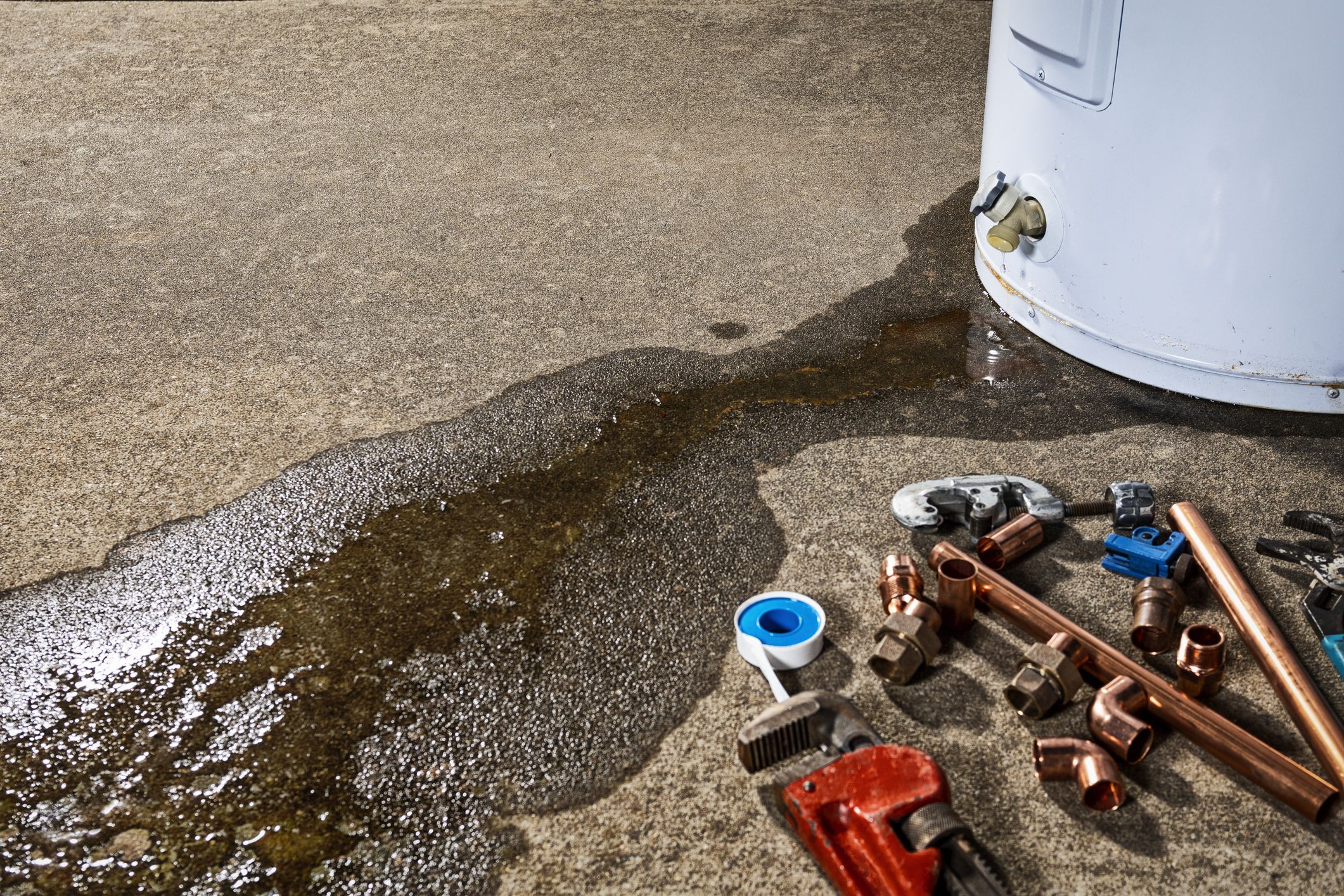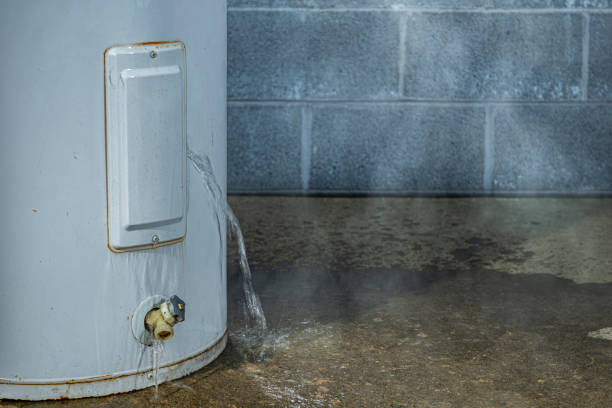Vital Recommendations for House Owners Managing Malfunctioning Hot Water Systems
Vital Recommendations for House Owners Managing Malfunctioning Hot Water Systems
Blog Article
We have unearthed this great article about Broken Water Heaters down the page on the net and decided it made perfect sense to relate it with you in this article.

Whether it is situated in the basement or a separate room, busted water heating units can trigger stress and anxiety. Having no warm water supply is also troublesome.
Shut Down Power Source
Before calling the plumber, shut down a gas water heater by transforming the temperature dial. This is usually found at the top of the thermostat. Switch off the circuit breaker if you have a version that runs on electric power. This will protect against electrocution, particularly if there is a leakage as water is a conductor. Generally, the burner shuts off when the water hits a specific temperature. But with a busted storage tank, it might malfunction. Sufficing off guarantees you remain risk-free.
Cut Off the Cold Water Supply
Cut off the tanks faucet water supply from the source. This goes from your major water line into the container. When your storage tank remains in good condition, the cold water stops filling out when the storage tank is full. Yet given that it is dripping, the water will remain to move. Close the shutoff located at the top of the heater. Revolve this clockwise to shut it off. You have to turn off that major water supply line outside your home if you can not discover it or reach it.
Call the Plumber
After doing the initial 2 safety steps, you need to call your plumber ahead immediately to repair a burst hot water heater. Nonetheless, remember that your unit will not just conk out significantly overnight. There are usually indicators that your aging hot water heater has debris accumulation in the interior. Take note of the following:
Instead, as soon as you detect these indicators, have actually an expert come to examine your water heater thank. Commonly, water heating systems have a life expectancy of about 8 to 12 years.
Tidy up Building
After calling the plumber, paper damage by taking notes and also pictures so you can assert your property owner's insurance. From there, begin the prompt clean-up. Obtain any vital valuables to stop additional saturating. Get rid of any standing water to prevent mold and mildew and mold growth. If you have a completely submersible water pump, make use of that to drain the water. Or else, the conventional bucket technique will likewise work. Try to wipe out everything, consisting of wall surfaces as well as baseboards. Keep them running to maintain air distributing if you have an electric follower and also dehumidifier. This will help hinder mold and mildew growth.
Bear in mind, if you notice any type of concerns with your water heater, call the pros today. You can not take this problem gently due to the fact that a defective thermostat can increase water temperature to a dangerously high level, causing unintended burns. A damaged heater pressure relief valve can likewise cause a surge. For best outcomes, obtain an annual check so your device obtains checked, cleansed, drained, and refilled, assuring ideal performance.
Whether it is situated in the basement or a separate space, broken water heating systems can trigger tension. Prior to calling the plumber, shut off a gas water heater by transforming the temperature dial. After doing the very first two security steps, you need to call your plumber to come right away to fix a burst water heater. If you have a submersible water pump, make use of that to drain the water. Keep in mind, if you observe any type of issues with your water heating system, call the pros right away.
8 REASONS YOUR HOT WATER HEATER IS NOT WORKING & HOW TO FIX
Water Heater Problems & Solutions
Loose or Damaged In-Line Valve
Unlike a water leak near the bottom of your water tank, a water leak on top of your system can be easily fixed. A common cause of water tank leaks includes a loose in-line valve. This is a handle that is located at the top of the water tank that is engineered to activate or deactivate the flow of water. To fix this problem, you will need to secure the nut that holds the ball or in-line valve in its location. If the leak becomes more severe once it is tightened, you will be required to travel to your local hardware store to purchase a new in-line valve for your water heater.
Damaged Pressure Relief Valve
Most types of water heaters are equipped with a pressure relief valve that is engineered to discharge pressure from the water tank when it becomes too high. If this valve on top of your water heater begins to leak, we recommend purchasing a new one online or from your local store. The process of removing and replacing pressure relief valves is not complicated.
No Warm Water
If you have an electric water heater in your home, the most typical cause of a lack of warm water is a broken heating element. Your water heater is equipped with two heating elements that are tasked with heating incoming water in the water tank. Once a heating element begins to malfunction, you will have little to no hot water to use for showering, cleaning, and laundry.
Low Supply of Hot Water
Are you continuously running out of warm water? This issue may be a byproduct of a cracked dip tube. This tube is engineered to push cold water to the base of your water tank to be heated. Once a crack or hole begins to form in the dip tube, the incoming supply of cold water may be released near the top or middle of your tank. As a result, the cold water on top of the tank will be sent to the faucets and showers in your house. This hot water heater problem can only be fixed by replacing the dip tube on your system. Since the process of installing a new dip tube is complex, we recommend calling a certified technician for help.
A low supply of warm water may also be a signal of excess sediment buildup in your water tank. As your water heater reaches the middle of its life cycle, minerals in water including magnesium and calcium will begin to collect at the base of the water tank. As the minerals continue to grow, there will be less room in the water tank to store hot water. To resolve this problem, flush your water heater to remove the excess minerals.
Water is Too Warm or Cold
If the water in your shower feels uncomfortable hot or cold, you can adjust the temperature of your water by changing the settings on your thermostat. Setting the temperature to 120 degrees Fahrenheit may help you save money on your utility bills. This is an excellent temperature to use if you’re worried about scalding or skin irritation. Does this temperature feel too cold? You may also adjust the thermostat to 140 degrees Fahrenheit to make your showers more pleasant. If your hot water heater is not working when you change the temperature, this is an indicator of a broken thermostat. Immediately find a certified plumbing or heating contractor in your area to repair or replace your thermostat.
Low Water Pressure
Low water pressure is not always caused by a malfunctioning water heater. If you live in an older home with smaller water pipes, the flow of water will be restricted prior to reaching our kitchen or bathroom skins. The only way to eliminate this hot water heater problem is to connect new ¾-inch water lines to your system. Another type of problem that may negatively impact your water pressure includes calcium deposits in water pipes.
As magnesium and calcium begin to form in your pipes, the diameter of your water lines will become smaller. As a result, the warm water from your water heater will not be able to travel in an efficient manner to your sinks or appliances. Since the process of replacing water pipes includes removing drywall, an average homeowner that does not have a plumbing license will not be able to fix this hot water heater problem.
https://www.wmhendersoninc.com/blog/8-reasons-your-water-heater-is-not-working-how-to-fix/

As a keen reader on Maintaining & Draining a Water Heater, I figured sharing that excerpt was important. In case you appreciated our article kindly remember to pass it around. Kudos for your time. Visit again soon.
Opt for our expert plumbers. Report this page